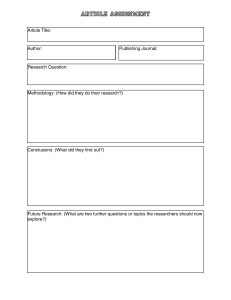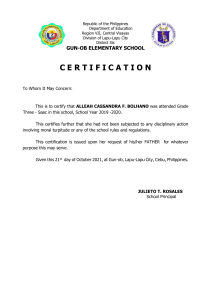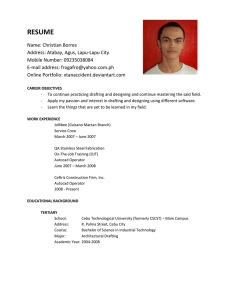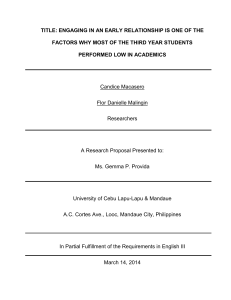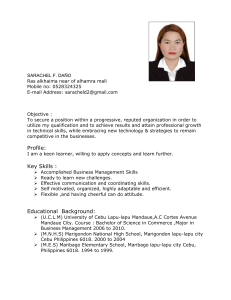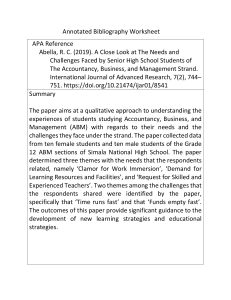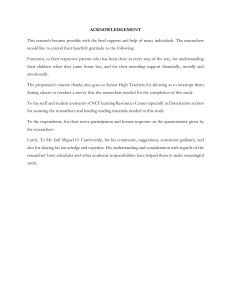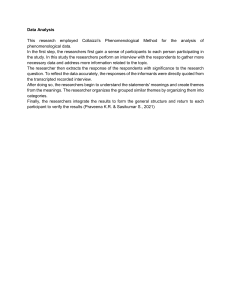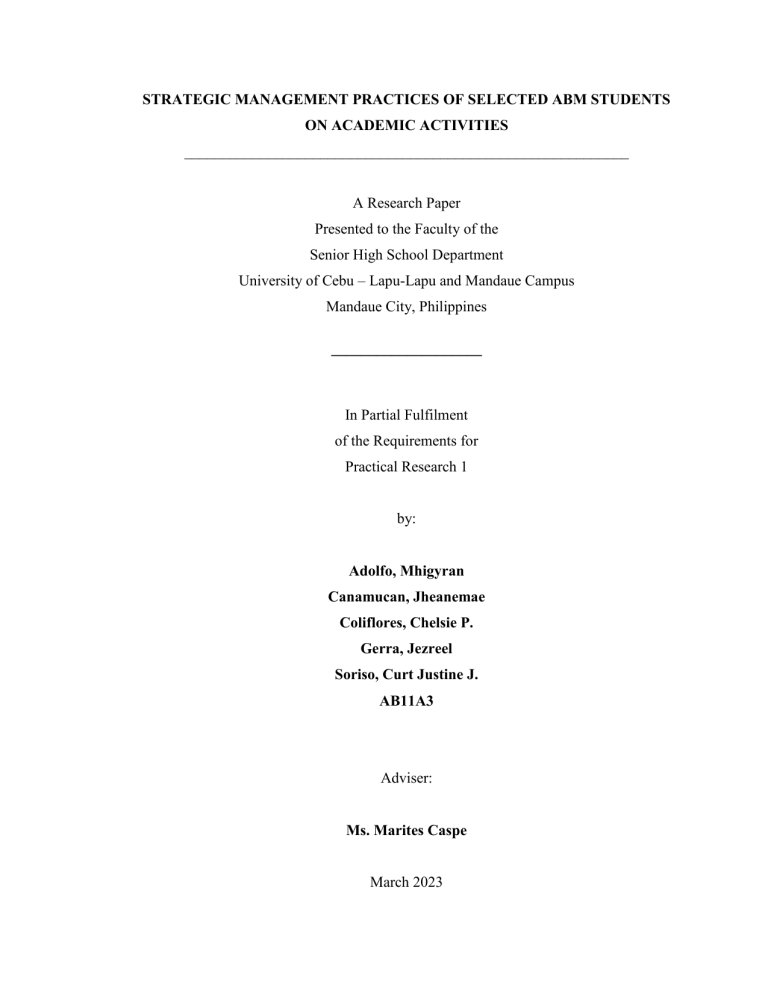
STRATEGIC MANAGEMENT PRACTICES OF SELECTED ABM STUDENTS ON ACADEMIC ACTIVITIES ___________________________________________________________ A Research Paper Presented to the Faculty of the Senior High School Department University of Cebu – Lapu-Lapu and Mandaue Campus Mandaue City, Philippines ____________________ In Partial Fulfilment of the Requirements for Practical Research 1 by: Adolfo, Mhigyran Canamucan, Jheanemae Coliflores, Chelsie P. Gerra, Jezreel Soriso, Curt Justine J. AB11A3 Adviser: Ms. Marites Caspe March 2023 CHAPTER 1 THE PROBLEM AND ITS SCOPE INTRODUCTION Rationale of the Study Strategic management practices are critical for achieving success in any given activity, including academic pursuits. In today’s highly competitive academic environment, students need to adopt effective strategic management practices to achieve their academic goals. Strategic plans help schools identify important tactics that are necessary for their existence. Academic activities include studying, attending classes, completing assignments, taking exams, and participating in extracurricular activities. Effective strategic management practices can help students prioritize their academic activities, manage their time more efficiently, and achieve better academic performance. Strategic management provides overall direction to firms and involves specifying the organization’s objectives, developing policies and plans to achieve those objectives and then firms must be able to effectively allocate resources to implement the plans (Rothaermel, 2018). It is an essential concept that plays a vital role in achieving success in various fields, including academia. Strategic management practices have gained increasing attention in recent years, with organizations realizing the importance of developing and implementing effective strategies to achieve their goals. The integration of global perspectives into strategic management education can help students to better understand the globalization on business and the importance of strategic thinking in navigation this environment (Hitt et al., 2020). As such, understanding the strategic management practices in academic activities is crucial to enhancing their academic performance and career development. Research shows that strategic management practices can improve academic performance. In a study titled “Strategic Management Practices and Their Influence on Students’ Academic Performance in Public Secondary Schools in Kathiani Sub-County, Kenya” by Mulinge et al. (2021), it was found that there is a positive relationship between vision setting and students’ academic performance in public secondary schools in Kathiani Sub-County, Kenya. Strategic planning positively influenced students’ academic achievement. Similarly, according to Zhang (2018, as cited by Jiaqi, 2022), the primary purpose of strategic planning is to help universities adapt to the changing social environment, at the same time formulate feasible plans for the future of universities, and adjust the plans according to the changing situation. It helps students maximize their performance and achieve their academic goals. In a study titled “Strategic Management Practices and Performance of the SME’s in Bangladesh” by Ali and Qun (2019), it was found that adaptation of strategic management practices influence the organization’s performance. In the study titled “Strategic Management Practices of Selected State Universities and Colleges in Samar Island, Philippines” conducted by Tafalla (2022), it was stated that strategic management practices is of most significant value in providing start-up activities and allows these universities to chart their courses and focus on its future. In this section, the authors found that students who used strategic planning and time management practices had better academic performance than those who did not. Thus, strategic management practices can help students effectively achieve academic success. The study will take place in University of Cebu Lapu-lapu and Mandaue Campus. The University of Cebu Lapu-lapu Campus is a significant setting because, recently, more events have happened with different culminations. Different strategic management practices have been used by students and teachers to accomplish the events successfully. According to a research article by Bakar et al. (2011, as cited in Gure & Karugo, 2018), strategic management is a concept that concerns making decisions and taking corrective actions to achieve long-term targets and goals of an organization. Strategic management practices are the direct organizational application of the concepts of business strategy that have been developed in the academic realm to maximize the utilization of resources in relation to objectives (Dennis et al., 2019). As stated by Schermerhorn (2006), strategic management is the process of formulating and implementing strategies to accomplish long-term goals and sustain competitive advantage. According to the Law Insider dictionary, academic activity means any assigned work or project used to determine academic credit, including an examination, writing project, take-home test, or other project. The concept of strategic management is widely used in the business context to achieve organizational goals. According to the recent survey of universities by Jiaqi (2022), although the strategic management of universities is important, it is still a corner that is forgotten by school management, especially in local universities. Little attention has been paid to the application of strategic management practices by students in their academic activities. As students navigate their academic journey, they face various challenges such as time management, workloads, and prioritization. The aim of this study is to identify strategies used by selected ABM students on their academic activities in University of Cebu Lapu-Lapu and Mandaue in the second semester of the School Year 2022-2023 and how these practices help them accomplish effectively with no hindrance. Studying the strategies used by selected ABM students on their Academic activities can provide efficient strategies that can help students succeed academically. In order to address the research aim, it seeks to identify the specific questions: What are the strategic management practices used on academic activities in terms of: debate, examinations, quiz bowls, and Academic clubs; How will strategic management practices help the academic activities of the students and What proposal can be done based on the findings. The result of the study will be the basis for students to determine which strategies to use when achieving a particular skill, and so they can find more strategies to cope in performing their academic activities. Moreover, the results of this study will also serve as a basis for teachers, as it provides awareness of the strategies students use in order to perform well in their academic activities. Furthermore, it will be beneficial to the researchers as it expands their knowledge and understanding in this particular field. Lastly, this study will be the basis for the future researchers to gain knowledge, use it as a reference for future studies, and present different outcomes in accordance with the findings. Atheoretical Stance In the light of conducting a qualitative study, there is a temporary suspension of a priori assumptions. As a consequence of preventing subjectivities, the study will also involve a suspension of literature review. However, in the course of conducting data analysis and interpretation, the related theories and literature shall be extensively used. Lastly, the identification of the theory will be done after data collection and analysis. Philosophical Stance The philosophy behind this study is anchored on Pragmatism. Pragmatism as a research paradigm finds its philosophical foundation in the historical contributions of the philosophy of pragmatism (Maxcy, 2003) and, as such, embraces plurality of methods. Pragmatism is a philosophical approach that emphasizes the practical consequences of ideas and actions. It focuses on the usefulness and effectiveness of a concept or practice, rather than on its theoretical or abstract qualities. As this study looks at the strategic management practices of selected ABM students on academic activities, one philosophical assumption of pragmatism is ontological in nature -that is, reality is constantly renegotiated, debated, and interpreted in light of its usefulness in new unpredictable situations. In the process of conducting this research, the researchers intend to collect the strategic management practices that students used in their academic activities to identify the effective approaches to academic management that other students can adopt. Hence, the philosophical assumption being derived is epistemological. Another equally imperative aspect of this study is axiological in nature, which delves into the role of values for both the researchers and the key informants of the study. This assumption can help us understand how students approach strategic management in their academic activities and the values that underlie these practices. Consequently, selected ABM students of the Senior High School department are made to gain insights into why and how they make decisions about their academic activities. The language employed in this study is also extremely important because the researchers and key informants come from a variety of backgrounds and have a range of personalities and life experiences, particularly in terms of their level of education and exposure to different languages. The researchers write in a descriptive style and employ an engaging narrative style. As such, this idea takes on the rhetorical philosophical assumption. Finally, in terms of methodological assumptions, as this study primarily identifies the strategic management practices used by the students in their academic activities, the researchers narrow down the data from the general to the very specific in order to tailorfit the data to the objectives of this study. Consequently, because the raw and contextual data are summarized into a condensed form, the a priori principle is being employed, which ultimately derives an emergent theory from evidence. THE PROBLEM Domain of Inquiry This research identifies the strategic management practices used on academic activities among selected ABM students in University of Cebu Lapu-Lapu and Mandaue Campus in the Second Semester of the School Year 2022-2023, as basis for any proposal. In order to address the research aim, it seeks to answer the following questions: 1. What are the strategic management practices used on academic activities terms of: 1.1 debate; 1.2 examinations; and 1.3 quiz bowls. 2. How will strategic management practices help the academic activities of the students? 3. Based on the findings, what proposal can be done? Significance of the Study This study focuses on identifying the strategic management practices used on academic activities among the selected ABM students. The outcome of the study will be beneficial for the following: Students. This study will help them view which strategy to use when achieving a particular skill, and so they can find more strategies to cope in performing their academic activities. Teachers. The results of the study provide awareness to the teachers about the strategies students use in order to perform well in their academic activities. Researchers. This study will be beneficial to the researchers in terms of expanding our knowledge and understanding in this field. Future Researchers. The findings of this study will help future researchers gain knowledge, serve as a reference for future studies and present different outcomes in accordance with the findings of this research. Scope and Delimitation The general intent of this study is to identify the strategic management practices of selected ABM students on academic activities. The scope in this study pertains to the strategic management practices and the academic activities of the students in University of Cebu Lapu-Lapu and Mandaue Campus. The respondents will be the Grade 12 ABM students that are enrolled in the second semester of the School Year 2022-2023. Furthermore, the study delimits itself to seek information from the selected students on their academic activities in terms of debates, examinations, and quiz bowls. RESEARCH METHODOLOGY Research Design This study study utilizes the Phenomenological research design in determining the strategic management practices used by the selected ABM students in their Academic activities. The purpose of the phenomenological approach is to specify and identify a phenomenon through how they are perceived by the individuals in a situation. According to Sokolowski (2000), Phenomenology is the study of human experience and of the ways things present themselves to us in and through such experience. Phenomenology is the study of structures of consciousness as experiences from the first-person point of view (Smith, 2008). The researchers adapt the Phenomenological since the data that the researchers are going to gather focuses on the description of the personal strategies students use in order to succeed academically. Research Environment This study is to be conducted in University of Cebu Lapu-lapu and Mandaue Campus. It’s located in Mandaue, Metro Cebu, on A.C. Cortes Avenue. The University of Cebu Lapu-lapu Campus has with over 58,000 students ranging from pre-school to post-graduate students on 5 campuses. This study is to be carried out by the senior high school students, in which respondents are gathered in the Annex 2 Building, under the supervision of Ms. Marites Caspe. It is a significant setting because, recently, more events have happened with different culminations. Different strategic management practices have been used by students and teachers to accomplish the events successfully. Key Informants This study will gather the data from the selected senior high school students. The respondents will be the Grade 12 Students that are enrolled in the second semester of the School Year 2022-2023. Our accessible population in this study will be the 250 Grade 12 ABM students. From the Grade 12 ABM students, we will gather our 50 samples from the AM scheduled sections. Since the Grade 12 ABM has 4 sections (AM scheduled), we will select 13 respondents each section using the Purposive sampling method. The Purposive sampling method is to be used in this study because our target respondents are the top achievers since they are students who mostly use effective strategies to succeed academically. Research Instrument The researchers utilize a standardized-based questionnaire. The chosen data collection instrument is in accordance with the nature of the research problem, which is to determine the different strategic management practices used by the selected ABM students on their Academic activities. The questionnaire prepared and to be use in this study has 2 parts. The first part of the questionnaire prepared and to be use in this study consists of close-ended questions which is multiple choice. The second part is the openended questions which will help the researchers to determine the strategies used by the selected ABM students on their Academic activities. These distributed questionnaires for the Grade 12 ABM students are to be honestly and carefully answered conducive to collecting and gathering data, in accordance with the nature of the research problem. Dry Run Procedures A dry run is a test or rehearsal for public presentation or procedure. This is to be conducted to determine the dependability of the researchers’ standardized-based questionnaire to achieve the main objective of the study and to be used in gathering data. Then, the respondents of the dry run will be the top achievers of the ABM sections (AM schedule) in Grade 11. The dry run respondents won’t be incorporated as the final research participants to avoid familiarity of the tool and biases. Permission is to be asked from the sample participants and will also be educated on how to respond to the given questionnaires. Students will be highly encourage to think critically in answering each item. Research Procedures Gathering of Data. A letter of request to conduct the study will be prepared. The researchers will construct a survey questionnaire, validated by the subject teacher then the survey questionnaire are distributed. The researcher conducts the study in University of Cebu Lapu-lapu and Mandaue Campus through survey, because of the advantages of the survey method. This is the procedure of collecting data from the respondents: 1. Make a letter of consent to be approves by the Principal to grants us permission to conduct research on selected ABM students of University of Cebu through printed questionnaire. 2. After it is approves, the researchers will create a letter of consent, which will be approved by Ms. Marites Caspe, to present to the respondents prior to doing research on them and providing them with the printed questionnaire to be responded. To secure their willingness to take part in our research. 3. Giving the students the letter of consent prior to giving them the printed questionnaire, to ensure privacy of information and their willingness to participate. 4. The researchers will choose the 13 top achievers each section. The purposive sampling method is to be used in this study. 5. Starting on -----, the researchers will be distributing the printed questionnaires to the selected 50 Grade 12 ABM students of University of Cebu Lapu-Lapu and Mandaue during their vacant time. They will be informed ahead of time about the schedule of the survey. 6. In the given time frame, we hope to successfully gather needed data from the respondents. After the informants answered the questionnaire, the researchers will collect and tally the data for interpretation. The researchers will asks a statistician’s help in determining the appropriate statistical tools to be used and interpreting the data. Based on the data that will be gather, the researchers will come up with conclusion and recommendations for this study. Treatment of Data. The Statistical treatment of data is essential to make a use of the data in the right form. Sample Size / Sample Variance will be adopted in the analysis of the data for this research. The sample size of a survey most typically refers to the number of units that were chosen from which data were gathered. The sample variance is the square of the sample standard deviation and is represented by: (Using Calmorin's Formula). Ethical Considerations The key informants are free to take part in the study without being forced or coerced, and they also have the option of not doing so. They will be ensured that their responses are treated as confidential and used exclusively for academic purposes in the making of this research and will be fully informed regarding the aims, purpose, advantages, and potential hazards of the study. The researcher will take care to keep the participants at ease while carrying out this study. Trustworthiness of the Research
